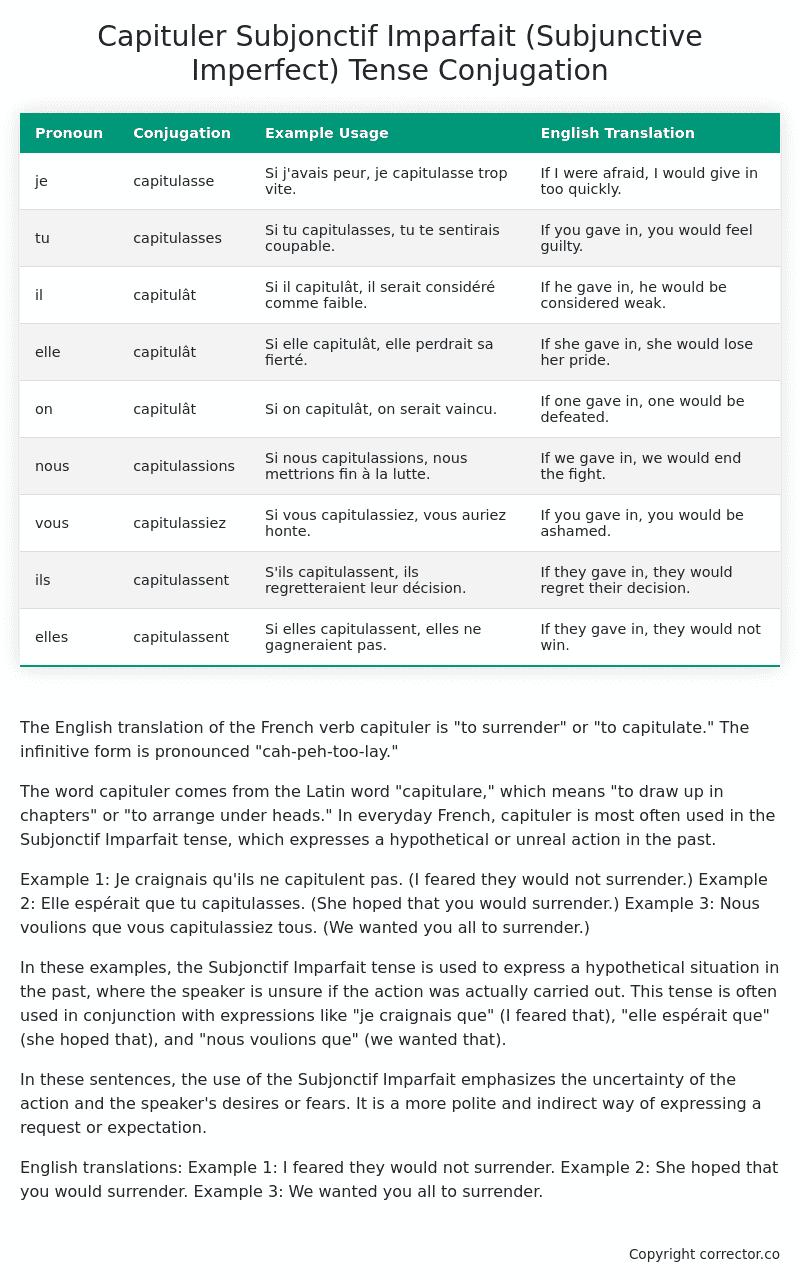Subjonctif Imparfait (Subjunctive Imperfect) Tense Conjugation of the French Verb capituler
Introduction to the verb capituler
The English translation of the French verb capituler is “to surrender” or “to capitulate.” The infinitive form is pronounced “cah-peh-too-lay.”
The word capituler comes from the Latin word “capitulare,” which means “to draw up in chapters” or “to arrange under heads.” In everyday French, capituler is most often used in the Subjonctif Imparfait tense, which expresses a hypothetical or unreal action in the past.
Example 1: Je craignais qu’ils ne capitulent pas. (I feared they would not surrender.)
Example 2: Elle espérait que tu capitulasses. (She hoped that you would surrender.)
Example 3: Nous voulions que vous capitulassiez tous. (We wanted you all to surrender.)
In these examples, the Subjonctif Imparfait tense is used to express a hypothetical situation in the past, where the speaker is unsure if the action was actually carried out. This tense is often used in conjunction with expressions like “je craignais que” (I feared that), “elle espérait que” (she hoped that), and “nous voulions que” (we wanted that).
In these sentences, the use of the Subjonctif Imparfait emphasizes the uncertainty of the action and the speaker’s desires or fears. It is a more polite and indirect way of expressing a request or expectation.
English translations:
Example 1: I feared they would not surrender.
Example 2: She hoped that you would surrender.
Example 3: We wanted you all to surrender.
Table of the Subjonctif Imparfait (Subjunctive Imperfect) Tense Conjugation of capituler
| Pronoun | Conjugation | Example Usage | English Translation |
|---|---|---|---|
| je | capitulasse | Si j’avais peur, je capitulasse trop vite. | If I were afraid, I would give in too quickly. |
| tu | capitulasses | Si tu capitulasses, tu te sentirais coupable. | If you gave in, you would feel guilty. |
| il | capitulât | Si il capitulât, il serait considéré comme faible. | If he gave in, he would be considered weak. |
| elle | capitulât | Si elle capitulât, elle perdrait sa fierté. | If she gave in, she would lose her pride. |
| on | capitulât | Si on capitulât, on serait vaincu. | If one gave in, one would be defeated. |
| nous | capitulassions | Si nous capitulassions, nous mettrions fin à la lutte. | If we gave in, we would end the fight. |
| vous | capitulassiez | Si vous capitulassiez, vous auriez honte. | If you gave in, you would be ashamed. |
| ils | capitulassent | S’ils capitulassent, ils regretteraient leur décision. | If they gave in, they would regret their decision. |
| elles | capitulassent | Si elles capitulassent, elles ne gagneraient pas. | If they gave in, they would not win. |
Other Conjugations for Capituler.
Le Present (Present Tense) Conjugation of the French Verb capituler
Imparfait (Imperfect) Tense Conjugation of the French Verb capituler
Passé Simple (Simple Past) Tense Conjugation of the French Verb capituler
Passé Composé (Present Perfect) Tense Conjugation of the French Verb capituler
Futur Simple (Simple Future) Tense Conjugation of the French Verb capituler
Futur Proche (Near Future) Tense Conjugation of the French Verb capituler
Plus-que-parfait (Pluperfect) Tense Conjugation of the French Verb capituler
Passé Antérieur (Past Anterior) Tense Conjugation of the French Verb capituler
Futur Antérieur (Future Anterior) Tense Conjugation of the French Verb capituler
Subjonctif Présent (Subjunctive Present) Tense Conjugation of the French Verb capituler
Subjonctif Passé (Subjunctive Past) Tense Conjugation of the French Verb capituler
Subjonctif Imparfait (Subjunctive Imperfect) Tense Conjugation of the French Verb capituler (this article)
Subjonctif Plus-que-parfait (Subjunctive Pluperfect) Tense Conjugation of the French Verb capituler
Conditionnel Présent (Conditional Present) Tense Conjugation of the French Verb capituler
Conditionnel Passé (Conditional Past) Tense Conjugation of the French Verb capituler
L’impératif Présent (Imperative Present) Tense Conjugation of the French Verb capituler
L’infinitif Présent (Infinitive Present) Tense Conjugation of the French Verb capituler
Struggling with French verbs or the language in general? Why not use our free French Grammar Checker – no registration required!
Get a FREE Download Study Sheet of this Conjugation 🔥
Simply right click the image below, click “save image” and get your free reference for the capituler Subjonctif Imparfait tense conjugation!

Capituler – About the French Subjonctif Imparfait (Subjunctive Imperfect) Tense
Formation
Common Everyday Usage Patterns
Interactions with Other Tenses
Subjonctif Présent
Indicatif Passé Composé
Conditional
Conditional Perfect
Summary
I hope you enjoyed this article on the verb capituler. Still in a learning mood? Check out another TOTALLY random French verb conjugation!


